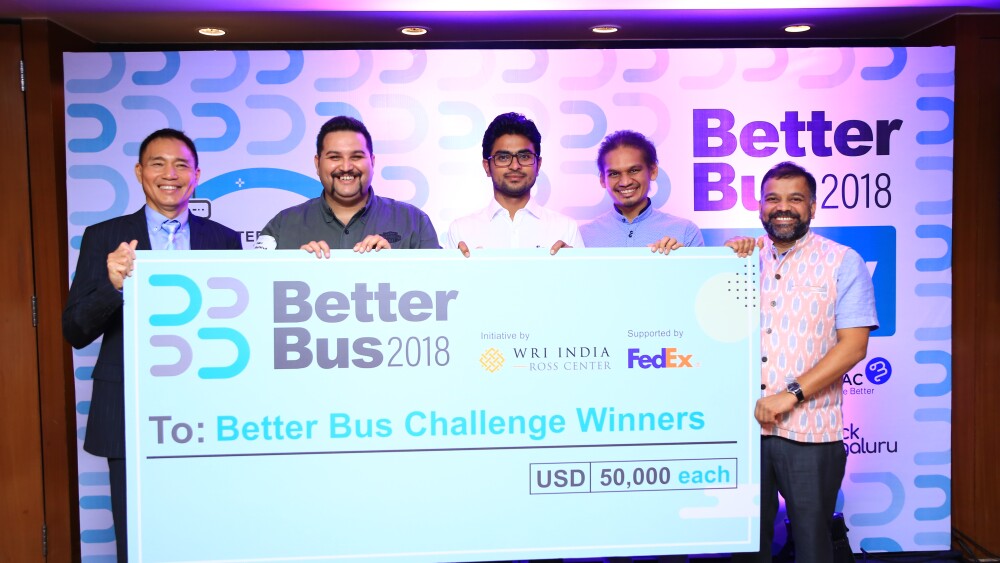BENGALURU, July 21, 2018: World Resources Institute (WRI) India Ross Center for Sustainable Cities, with support from FedEx Express, the world’s largest express transportation company and a subsidiary of FedEx Corp. (NYSE: FDX), today announced the three winners of the “Better Bus Challenge”, an open innovation contest that aims to bring innovative solutions in the public bus system in India, launched earlier in the year.
In its debut year, the “Better Bus Challenge” received an overwhelming response from bus manufacturers, electric vehicle manufacturers, technology and service providers, mobility entrepreneurs, and non-government organizations.
Madhav Pai, Director, WRI India, emphasizing the need for such a challenge in India said, “The entries we received for the challenge, successfully demonstrates the potential of a platform that brings innovators and transit agencies together, to identify and develop solutions to modernize the city bus services across the country. Over the next year, the winning companies will work closely with the transit agencies to contextualize the solutions to the specific needs of their pilot cities and demonstrate the impact of their solutions on improving the efficiency, access and quality of commute for all.”
The winning solutions address three main areas of intervention. These include tools and service models to improve operational efficiency, improve commuter experience, and systems to support the transition to electric buses.
The winners went through an intense review process in three stages over the last six weeks. As part of the assessment, a team of industry experts shortlisted best applications to form the ‘Better Bus Cohort’. This cohort then underwent a four-day accelerator program, held in Bengaluru, receiving guidance from experts in the field of business, design, marketing, finance and investment to further develop the proposed solutions, and tailor them to suit the needs of Indian cities.
Earlier today, a panel of judges reviewed the pitches made by the ‘Better Bus Cohort’ and selected the three winning solutions, these include;
- Cell Propulsion provides a proprietary power train technology that can be retrofitted into buses to fully convert them to electric power. The company provides ARAI certified electric conversion kits that can be retrofitted in any bus body shop.
- Cityflo is an on-demand bus aggregator that provides customers with the opportunity to reserve seats on air conditioned buses in the city through their mobile application, at competitive prices. The company focuses on providing services mainly during peak hours to improve access and comfort on public buses.
- Small Spark Concepts presents MAFiA, a patent pending product that helps reduce pollution levels and improve the combustion efficiency of buses. The product, retrofitted one existing vehicle fleets, can reduce fuel demand and tailpipe emissions.
“At FedEx, we are committed to creating possibilities that deliver a positive impact for the communities where we live and work. Our objective in supporting the “Better Bus Challenge” was to encourage stakeholders to create innovative solutions for the public bus transit system in India, making it more affordable, accessible and sustainable. We have been impressed by the innovation and passion exhibited by all the participating teams, and look forward to the implementation of the winning solutions,” said Philip Cheng, vice president, Ground Operations India, FedEx Express.
Each winner will receive a financial grant of USD 50,000 to demonstrate their projects in the identified Indian city. The grant amount is further supplemented with mentorship from WRI India, who will collaborate with city bus agencies to pilot the selected projects, according to the needs of the respective cities in the coming year.
